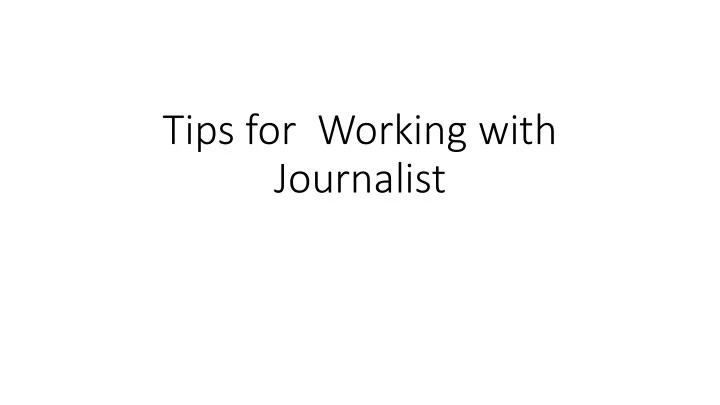

Tips for Working with Journalist
Remember You Are in Control of the Interview • The journalist is interviewing you. By your answers, you control where it goes. • Keep your composure if an interview gets rough (no crying in interviews!) • Never say or do anything that you don’t want to see repeated • Answer a question and then be quiet; reduce verbal fillers • If they come to your office, dress appropriately. • Be aware of your body language or verbal tics. This is like a deposition.
Set the expectations from the Start • “Before we go on record, I just want to be clear about what I can and cannot say in this interview.” • Be clear about your ethical obligations and limitations. If there are areas of the case or matter that you cannot discuss, then let the reporter know. • Most journalists respect the on-the-record/off-the-record distinction, but you have to be clear. • In some cases, it helps to start with background. If you are involved in a complicated or unique legal issue, given the reporter some basic background information or resources. • Speaking to a reporter is partially advocacy, but it is also public education. If you do nothing else help the reporter see the larger issues and policies or smaller process and legal issues.
Be Fair in Your Expectations • You do not get to choose or review your quotes. • You do not get to dictate the slant or approach of a story. • A reporter is not going to tip his or her hand about the story they are writing. They may not know what they are writing. • Be thoughtful of a reporter’s time. What is their deadline? How soon do they need a response? • Always call a reporter back. It’s the Emily Post thing to do! • If a reporter “gets something wrong,” do not call and scream. Explain the error and why it matters (make sure it does). If it is just because it makes you look foolish, consider it tuition. • Treat the reporter as a fellow Professional.
Quick Tips • Do not be afraid to say, “I do not know.” • If it is important, offer to call the reporter back with an answer. • Never say, “No Comment.” Find an alternate phrase such as, “I can’t • reply to that question because the matter is under legal review …” • When you cannot answer, explain why you can’t answer (see first slide) • Avoid hypotheticals, requests for an opinion, or speculation. Let them know “That’s not what happened, here are the facts …” or “That’s highly unlikely because …” “I’m not going to speculate on that.” • Use questions as a bridge back to your main points. (just like oral argument). • Keep it simple avoid jargon (or explain it). Save the ten dollar words for paying clients!
Advanced Preparation • If you know a call is coming, prepare. • Practice three key messages you want to communicate • Think about the reporter’s likely angle or approach to a story. If it is an abuse case, the lead will not be how the alleged perpetrator’s due process rights were not strictly followed. • What is your client’s story • Think about difficult questions you might get asked, and prepare answers ahead of time • Quotable quotes – think sound bites and metaphors that make a complex concept easier to understand. • Have quotes from helpful cases ready to quote or cite. • Practice your response
Final Thoughts • Be aware of your language (even off the record) • Be honest. Mistakes happen, but if you are not trustworthy, you lose your reputation. • Be prepared to push back when appropriate. If the questions indicate a position that is not fair to your client, then explain. (Missing information, holding the client to unrealistic expectations, taking a side in a disputed matter), but be fair to the reporter. If your client is in a tight spot, you cannot expect an unreasonable benefit of the doubt. • Remember, you are in control. Keep calm and positive! • Don’t be afraid of a little color. It’s not all sunshine and lollipops out there!
Recommend
More recommend